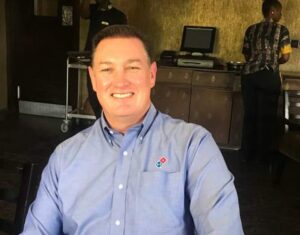From being just a very small company of 63 stores in 2018, today, Eat N’GO, a leading Quick Service Restaurant has grown to become a market leader with 175 stores in twenty states of the Nigerian federation. This is no mean feat, especially against the backdrop of different economic headwinds. However, the sailor behind the ship Mr. Patrick McMichael out -going Chief Executive Officer of the topmost QSR company has completed his tour of duty and on his way out of the Country.I n a no-hold-barred interactive chat with MARKETING EDGE team, the iconic leader and astute manager of men and resources, Mr. Patrick McMichael disclosed to MARKETING EDGE team that he has successfully built and positioned Eat N’GO to become Africa’s largest QSR. He spoke glowingly about team Eat’N’GO, huge opportunities in the Nigerian market and all the exciting moments working in Nigeria. He also advised other prospective investors in Nigeria to take the bull by the horn as the future of the Nigerian market is bright and beautiful. He spoke on several other issues as well. Excerpts:
How will you assess the Nigerian economy in terms of opportunities and potentials for growth?

The Nigerian economy: The Nigerian economy offers so much opportunity. Nigeria has a big population that is very young. As the country continues to develop these opportunities will only become bigger opportunities with more and more customers. The opportunities within Nigeria were the main reason that I accepted the role of CEO for Eat’n’Go in 2018. When I joined the company had 63 stores. My team and I have built the company up to 175 stores in Nigeria in 20 states through some very challenging times. Imagine where we could have built to with stability globally and locally. My view is that we have at least 200 more stores to develop in Nigeria. As the new policies of the current government settle in I believe stability will improve and opportunities will accelerate. There are exciting times ahead for Nigeria. Big infrastructure falling into place that will certainly help.
Would you say Nigeria offers any hope for foreign investors?

Foreign Investors: I believe that foreign investors need to have a long-term view on investing into developing countries. There are great opportunities that require patient capital structures. There have been many companies that have left Nigeria recently. I expect that they will return in the years to come as the opportunity of Nigeria has not gone away. Many companies had the wrong supply chain or capital structure to handle the shock of the last five years globally and domestically. There is a huge developing customer base in Nigeria. As the national power grid becomes solid and fuel is refined locally things will change. The more that Nigeria can reduce imports and become a producer, more companies will want to be in business in Nigeria. This will then lead to Nigeria becoming a multi-industry exporter to the world.
What was your first impression about the country Nigeria when you came almost 10 years ago?

My first impressions: Despite so many people arguing that Nigeria has not developed over the last decade, I would disagree with this. I recall when I first arrived in Nigeria driving on the dirt road from the airport to the office on Victoria Island. I saw buildings cut in half etc…. That road is now a proper freeway. The third mainland bridge is now impressive. I remember running the Lagos marathon across that bridge. It was in bad shape. The new international airports are open, several big rail projects have been completed. I always judge development by how many cranes I can see across the city skyline. Despite the recent economic challenges that have faced Nigeria, there are quite a few cranes for new buildings coming up. My first impressions were that this is a developing country, and it is going to take time. Having worked in Indonesia as CEO of Domino’s Pizza, I was already well conditioned to developing countries. I actually felt quite at home when I arrived in Nigeria. Everyone spoke English which was very different to Indonesia. Secondly Nigeria has a great vibe. The people were all very welcoming everywhere that I went. I will miss this a lot when I leave.
Were you apprehensive or anxious about anything when you first heard you would be posted to Nigeria? If Yes, how did you resolve this?

Working in Nigeria as an expat: I get this question all the time here in Nigeria when I am overseas. Working in any country you have to take time to understand the country and culture of your host country. You then need to respect the culture and the people of the country. I have found that a simple smile and a “hello” is a great ice breaker in whatever situation I am in. I had a sign up in my office that I feel is critical to understand. It read very simply; “ I don’t care about your job title, how much money you have or your social status. I only care about how you treat people” As an expat in a developing country you often live a life of privilege that demands that you be courteous and have manners. Beyond this basic rule, I have had a very enjoyable life as an expat in Nigeria. I have made a lot of friends that are a mixture of expats and Nigerians. I was lucky enough to meet my partner Ania here in Lagos. We have an amazing life here for five years now. I have found the local population to be so welcoming. I have had some awkward moments for sure, however I have managed to break them down with a smile. I hope that that is something that I am remembered for in Nigeria.
How will you assess the state of Eat’n’Go which you were to head when you came? How will you assess the growth and development of this company in this past one decade?

Eat’n’Go: As I previously stated Eat’n’Go was a much smaller company when I arrived. It has 63 stores between Lagos, Abuja and Ibadan. There were 4 commissaries to support the business and a small warehouse. During my time with Eat’n’Go, my team I were able to build the company up to 193 stores in two countries with the acquisition of the Dominos and Cold Stone franchises in Kenya during the pandemic. We have expanded from 4 commissaries to 11 commissaries and relocated to a much larger warehouse to create a proper national distribution centre to support the company’s operation in 20 states of Nigeria. We created employment opportunities for over 3000 people in Nigeria. This does not count the employment that was created in companies that supported the growth of Eat’n’Go. The ripple effect of the success of Eat’n’Go has further benefited the Nigerian economy. As the company was growing quickly, we further developed the operating systems of the company to support the growth through strong operations. The Eat’n’Go of today is a much bigger and more complex business than it was in 2018 when I arrived. I am very proud that we have grown our sales every year during my tenure. We have maintained our margins despite strong headwinds in the economy. We were able to raise funds through bonds to drive our expansion on three occasions maintaining an investment grade rating at all times. It is a credit to the hard work of the entire Eat’n’Go team.
You were said to have brought several innovations and creativity to grow this business during your term of office. What inspired you to achieve these?

Innovation: Innovation has been a key pillar in the success of Eat’n’Go. The management team has been very focussed on ensuring that we remain at the forefront of customers thoughts during my time with Eat’n’Go. We have continued to innovate with new products. We quite often infused local flavour into the new products which has been very popular. We launched the very popular jollof rice and roasted chicken to the Dominos menu. Rice is served in many Dominos markets around the world. We introduced hot dogs into Cold Stone to get more lunch trade. We launched the very successful Smallie pizza which took the market by storm as it was very affordable for the general population. We were able to introduce a call centre to help our customers order from better trained agents. This has worked really well. It also allows us to call our customers back to get feedback on our products and service. We introduced QR code customer feedback options. We win customers one at a time and we have to do everything we can to keep our customers happy. We further partnered with aggregators to be more convenient to our customers. I have a big sign on the wall of the marketing office. It is very simple, “Think like a customer” . So many companies forget to do this. They tell customers what they want and how they will buy it. My view is just the opposite. Listen to customers and create options that work for customers. Innovate in ways that work for your customers and make your company faster and better. Dominos Pizza Nigeria was the first market globally to launch the 20-minute delivery guarantee for customers. This really brought a lot of focus in the stores to making sure that we provided the best possible service.
How will you describe or assess the workforce you met on ground? And how will you assess the workforce and the management you are leaving behind as legacy?

Team: I have been blessed to have worked with some excellent team members in Eat’n’Go at all levels of the company. One of the first things that we agreed on in 2018 was that whenever possible we will promote from within. This has created a career path for our team to grow as the company grows. It has been very successful. It is great to watch your team enjoy career success as the company has success. This is so critical in building positive culture in any company. There is a lot of talented and well-educated people in Nigeria that are looking for the right opportunity. When I arrived in Nigeria, we employed 14 expats in Eat’n’Go. As of today, with my departure we have only four. We were described as a textbook case study in developing local talent in the resent senate inquiry into expat employment in Nigeria. I am very proud of the focus that we have had on developing our team.
What were the most memorable things you did while you were in the saddle?

Most memorable: I have really enjoyed working with the Eat’n’Go team for so many reasons, however if I have to narrow down to my most memorable activity, it will have to be our involvement with the Slum to School charity. I believe that when you are succeeding in business that you must give back to those less fortunate. Over the last six years Eat’n’Go has donated over 80 million Naira to support thousands of Children to be able to attend school. This has been a great partnership. The activities around world literacy day were so much fun with all the school kids. The launch of the super hero’s campaign was really amazing. So many talented children ready and wanting to learn. I will continue to work with Slum to School after I finish with Eat’n’Go. There is still more work to do to get more kids into school. I would really like more people to donate every month to Slum to School. It is so easy, and it makes a big difference to kids’ lives now and well into the future. Go to their website and sign up.
What is your parting advice to both the employees and the management?

Looking forward: I have full confidence that Eat’n’Go will continue to prosper in Nigeria. As the current economic conditions improve there will be a surge in business that all companies will enjoy. Eat’n’Go is well positioned with strong international brands to continue growth in Africa well into the future. The foundations have been laid to build Africa’s largest QSR company. To the Eat’n’Go team I would say as I have always said. “Success is rented not owned, and the rent is due every day!” Keep up the great work.
Your advise to future expatriates who may be posted to Nigeria.

Farewell: As I depart Nigeria I would like to thank the entire Eat’n’Go team. It has been a pleasure to work with everyone at all levels of the organization. It has been an amazing journey over the last six years. Who could have imagined that we would have a global pandemic. I actually chose to stay in Nigeria during the pandemic to lead the company through this crazy time. The challenges of SARS was another great challenge. I recall having to move the majority of our team into hotels very quickly as it all unravelled so fast that no one could get home. Wow! I would also like to thank all of our suppliers that have worked with Eat’n’Go. We have managed to localize 95% of our supply chain over this time. This is a major part of the success of Eat’n’Go. Our suppliers have been instrumental achieving this. A big thank you goes to those companies and funds that have invested in our bonds to support our growth. It was a privilege to present to the investment committees and to receive their questions and positive feedback. The management team really worked hard to achieve this milestone in the Nigerian QSR industry.

I would like to say a very big thank you to all of our customers. Without your support there is no business. We have always worked very hard to make every occasion a special occasion for you. I know we are not perfect, and we don’t always get it right, but we will always work to fix any problems. I said earlier that this business is built one customer at a time. We will always work hard to never lose a customer. I hope that my legacy extends into our customer focus.
Thank you, Nigeria, for welcoming me to your shores. I hope that I have had a positive impact on people’s lives and careers. I will always remember my time in Nigeria fondly as I now settle back into Australia after eight years away from my family. My kids are excited for me to be home again.





Comment
No comments found.